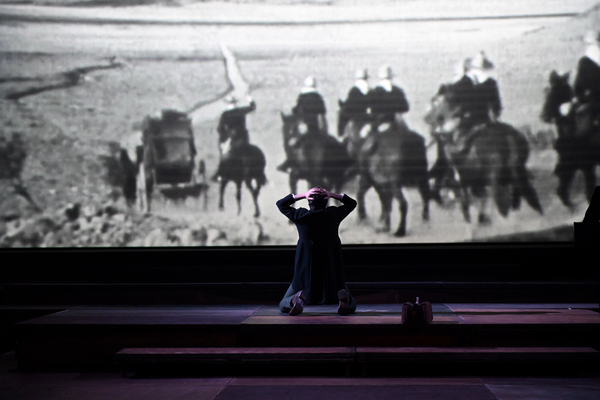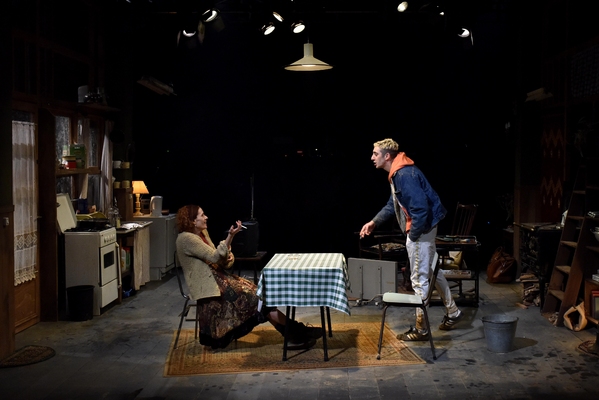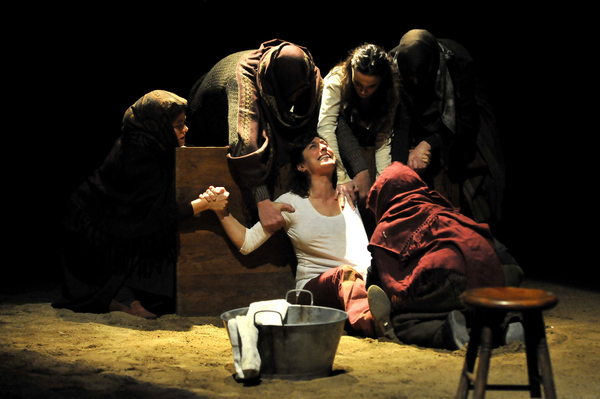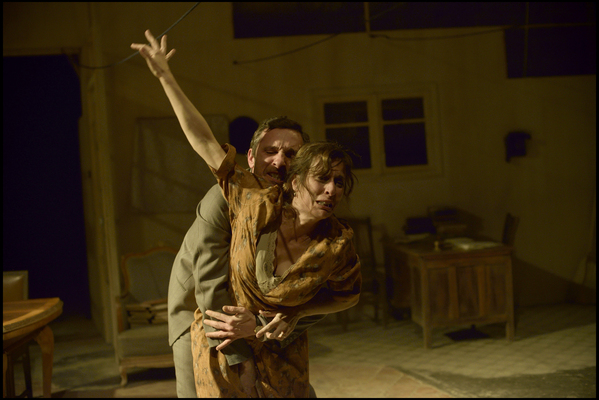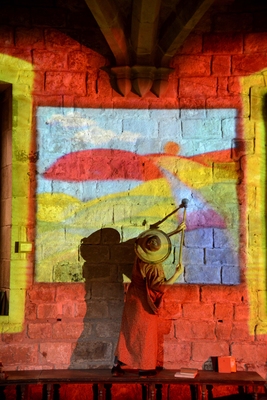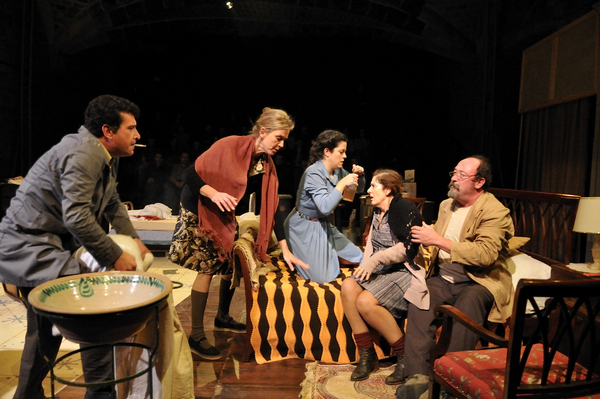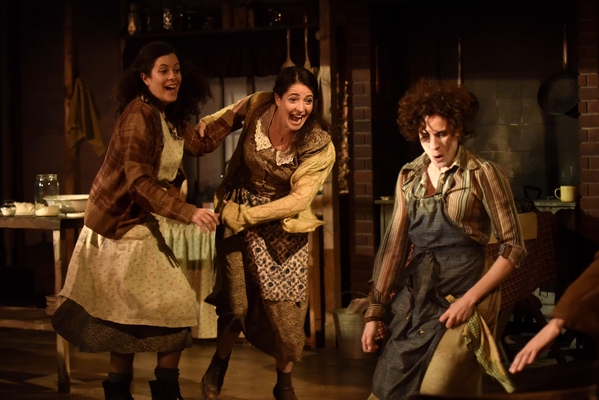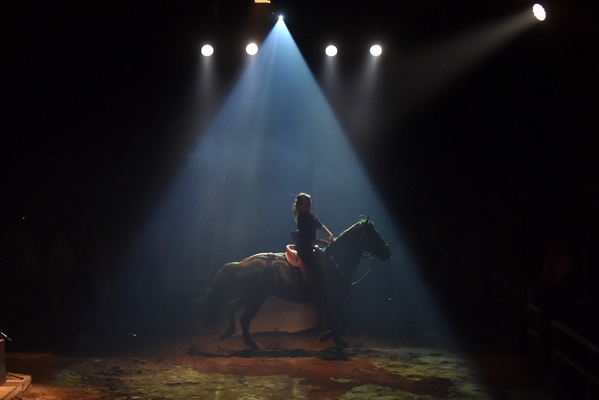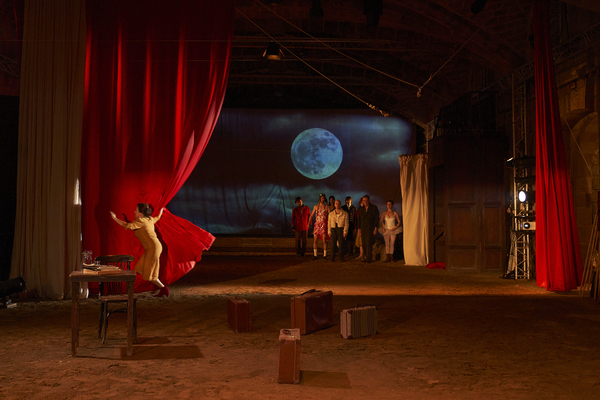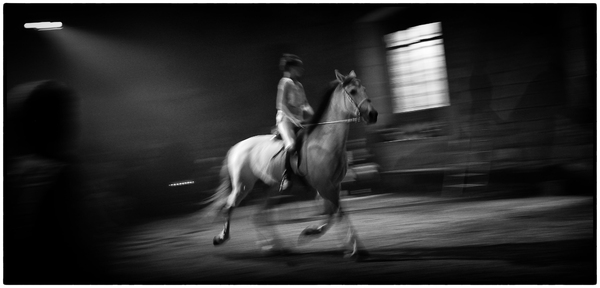We're a company, we're a production CENTER,
we're a theater.
La Perla 29 is a space of free creation, an emotion, a moment OF GULPING.
La Perla 29 is a centre of creation and theatre management from which we want to work freely and willingly. Born in Barcelona in 2002 as a stage creation platform, it has become one of the reference centres of the Catalan theatre scene with a strong international projection. Thanks to the effort and continuity we have built a solid team linked to the Teatre La Biblioteca, a unique and very praised theatre space.
With its own theatrical aesthetics, the artistic direction of Oriol Broggi and the management led by Bet Orfila move together to make each new show artistically stimulating and at the same time optimise the resources of every production.
This way of understanding the theatrical profession results in very personal and meticulous shows, which are widely recognised by the public and the critic, both local and international.
We're a company, we're a production centre, and we're a theatre space. And halfway through all these three. We are a management model, where art and production move forward together for each show. We're a stable team and we're a constellation of artists. We're a way of doing and understanding theatre.
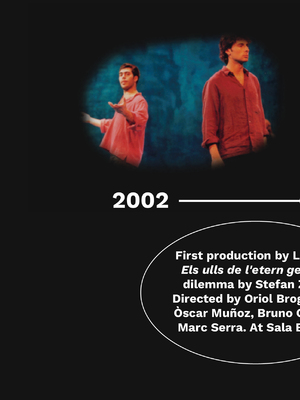
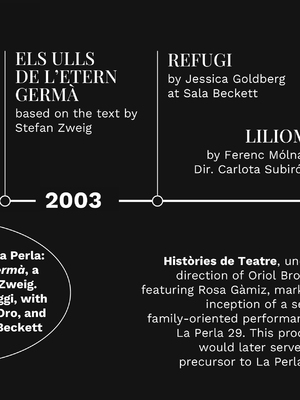
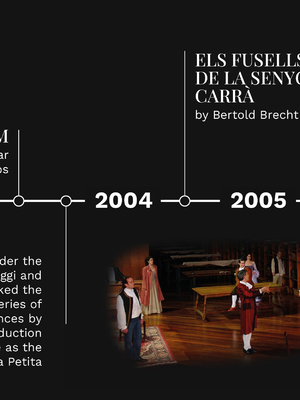
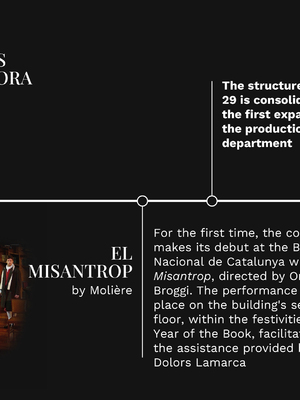
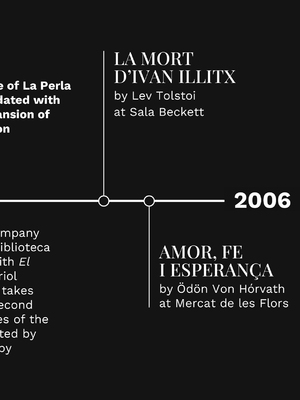
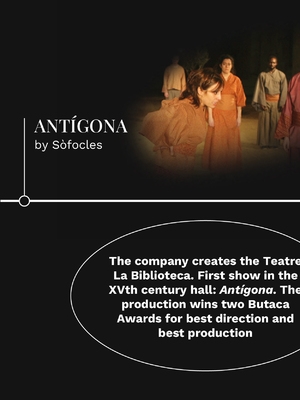
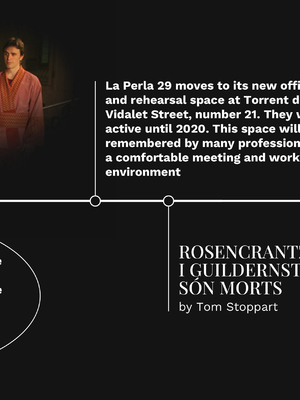
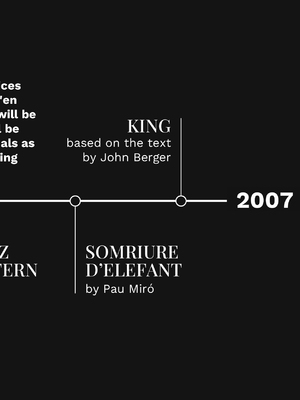
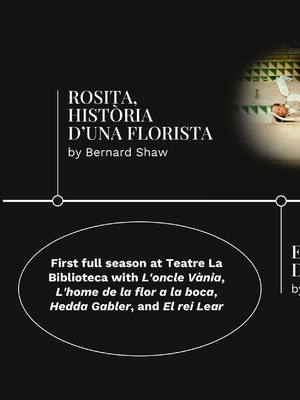
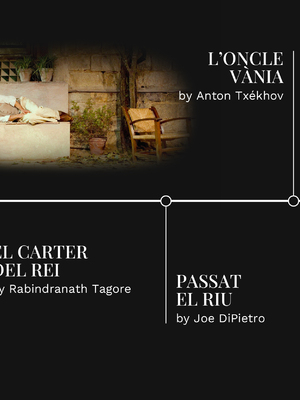
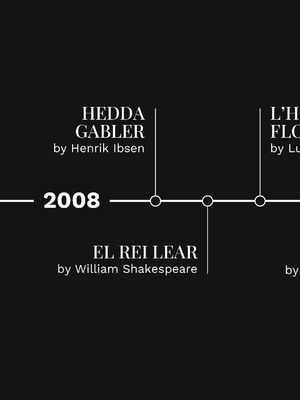
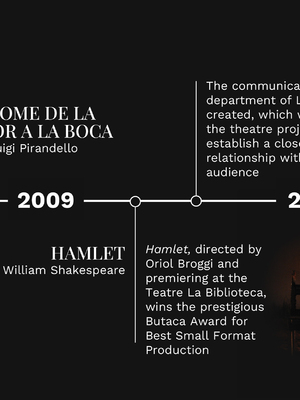
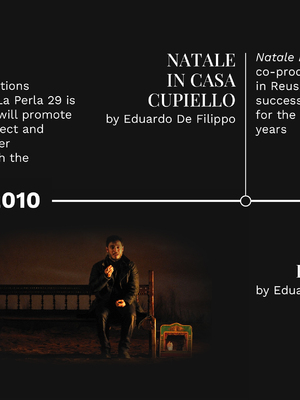
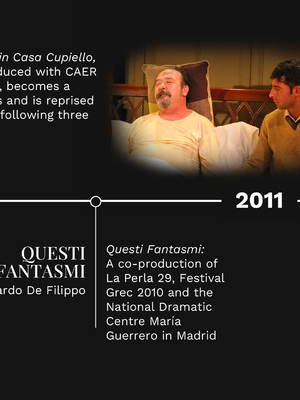
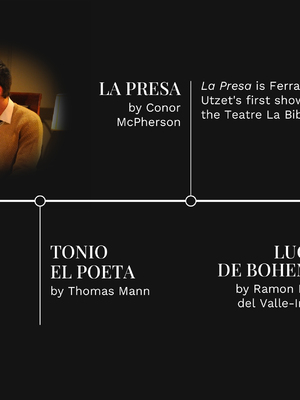

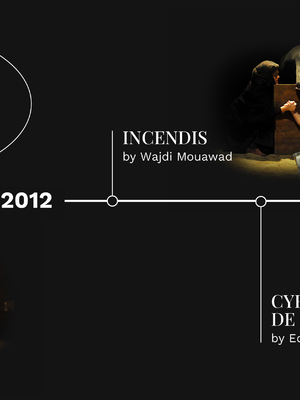
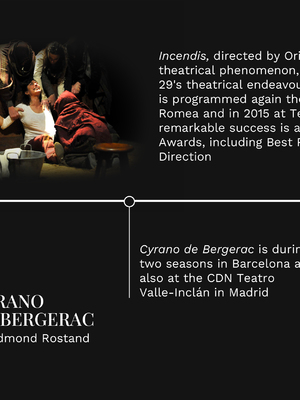
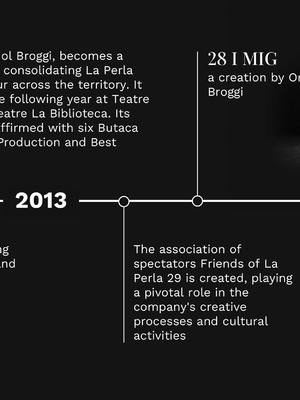
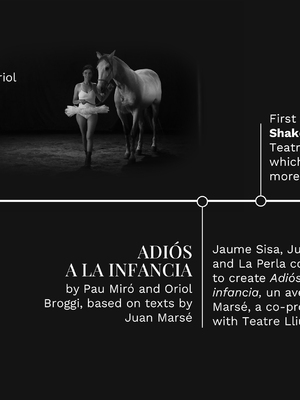
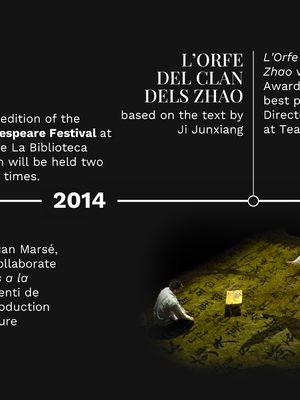
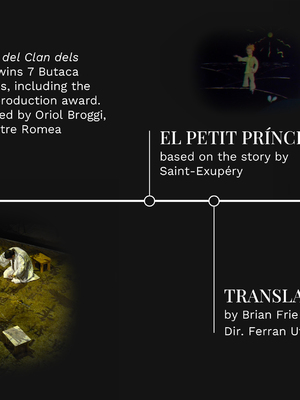
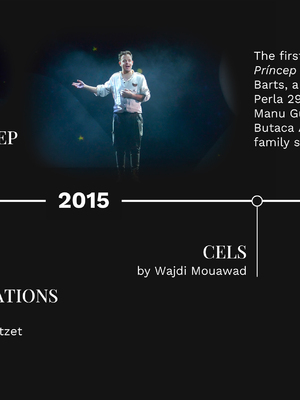
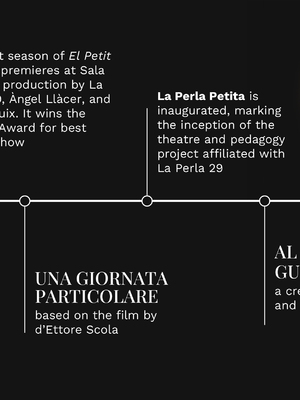
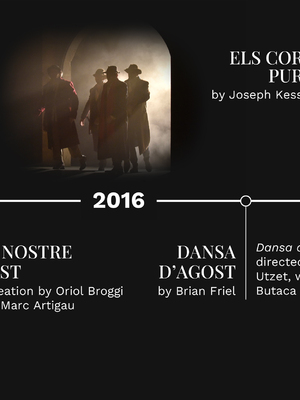
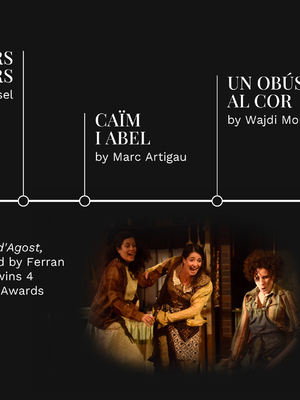
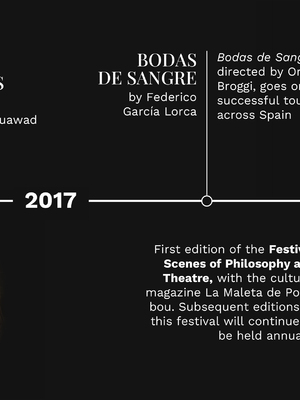
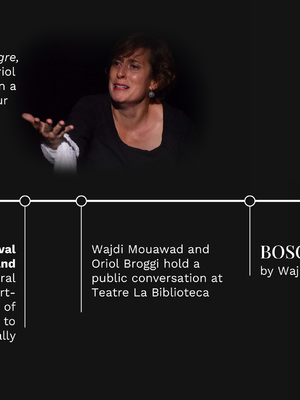
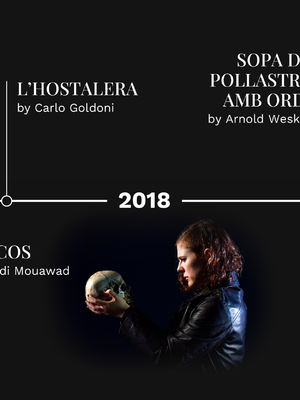
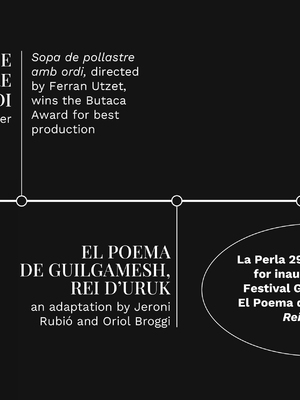
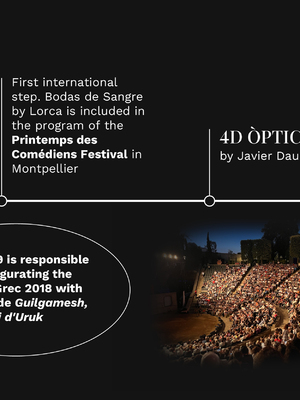
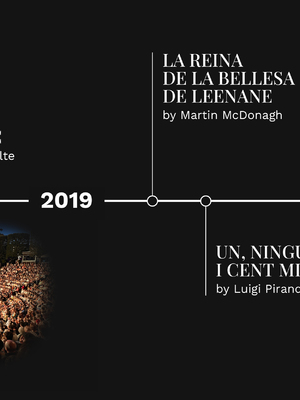
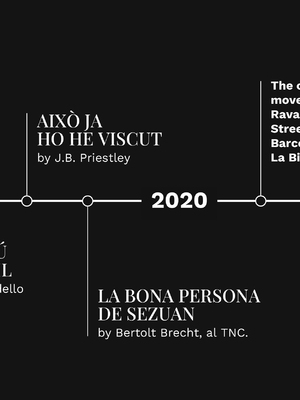
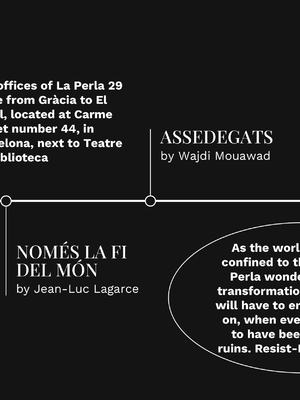
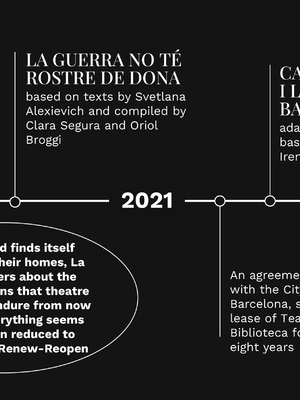
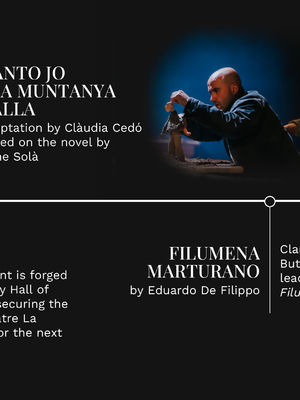
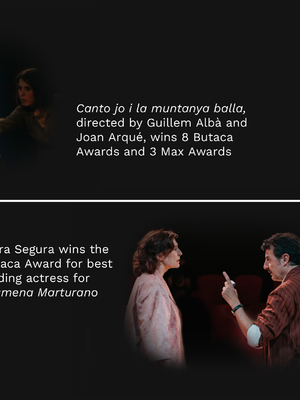
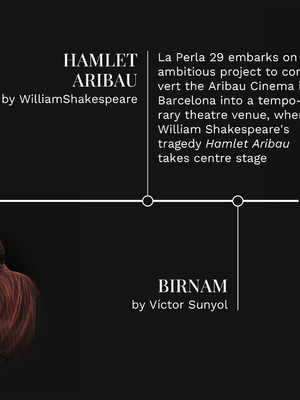
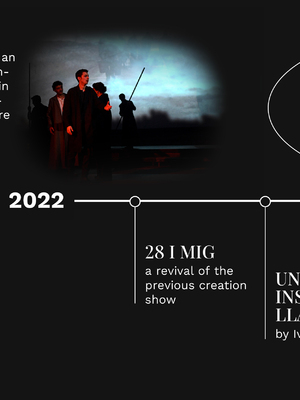
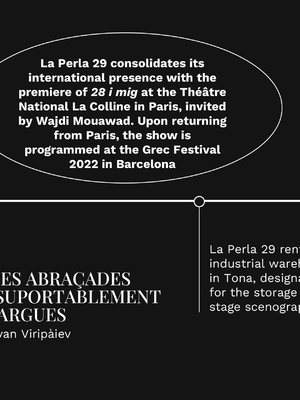
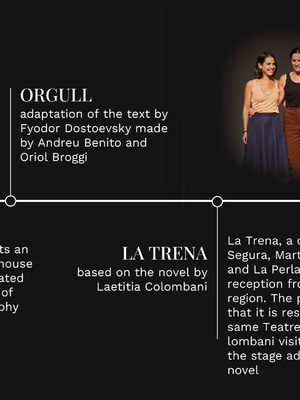
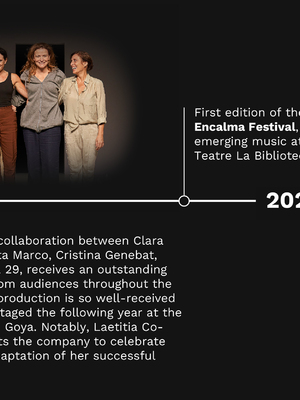
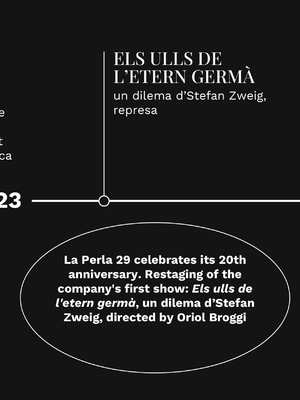
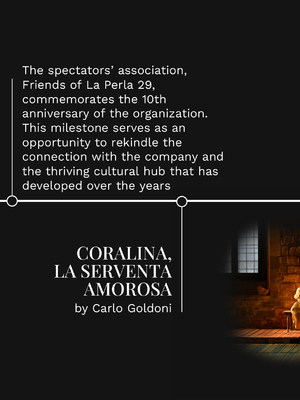

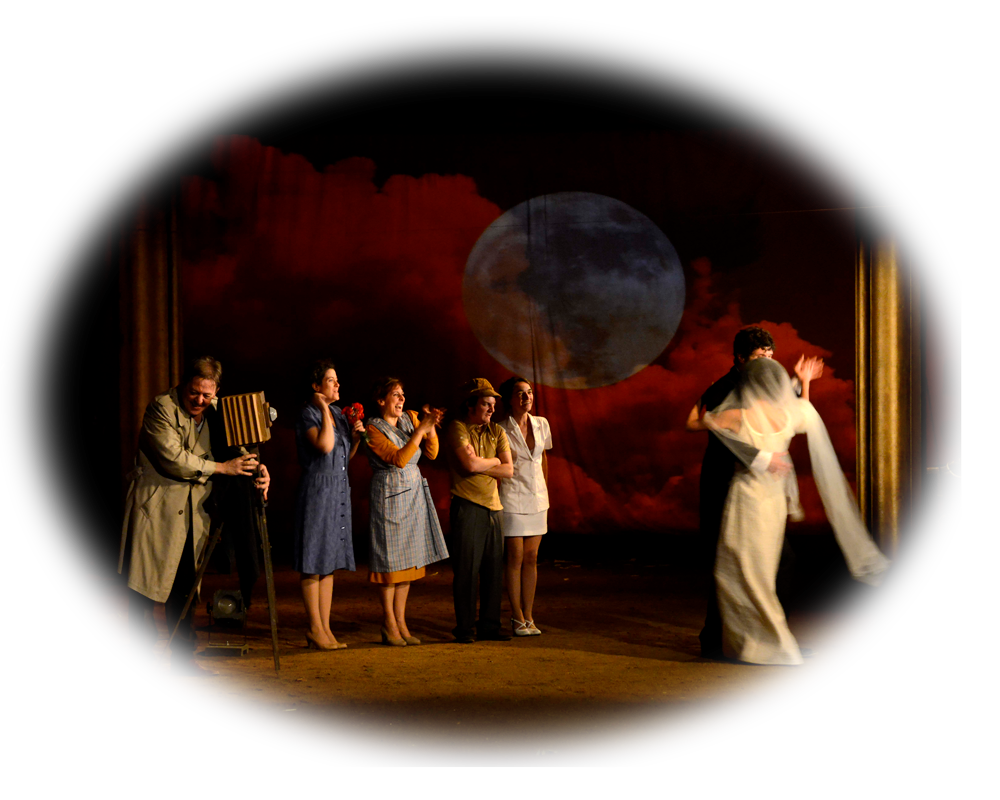
La Perla 29, the freedom of theatre
La Perla 29 was born in 2002 as a platform for the creation and management of theatre shows. Presently, it also serves as a hub for the performing arts situated within Teatre La Biblioteca, nestled in the heart of Barcelona. This unique venue occupies a Gothic chamber within the Catalan National Library. La Perla 29 produces its own shows while engaging in co-productions and hosting projects, artists, and companies at its theatre.
La Perla 29 advocates for a repertoire theatre that draws from the great classics, drawing inspiration from timeless classics while embracing contemporary scenic languages and emerging voices in dramaturgy. It fosters an intimate and artisanal approach to theatre, where language and tradition intersect with the present moment—a theatre of actors, ideas, and substance.
It aspires to craft a theatre that surpasses boundaries, actively involving the audience, where language and emotions combine to evoke an aesthetic encounter, without oversimplifying reality, but instead, communally addressing shared challenges with the spectator, guiding us along a path that is not always easy.
La Perla 29 continues its quest for a distinctive and sincere voice, a personalised approach to theatre-making, and an ongoing conversation with the city. It strives for a theatre rooted in skill and urgency, imbued with joy, vitality, and, above all, optimism. It embodies a disciplined yet free-spirited theatre, a testament to its unique management style that has firmly established this ethos as the hallmark of La Perla 29.
- References and Aesthetics
Salvador Espriu, a great Catalan poet, once said that he approached each poem like a shoemaker facing a pair of shoes, knowing that dedication and craftsmanship embody the essence of his art. It is from this same commitment to dedication and craftsmanship that La Perla 29's theatre springs forth. keep readingA theatre of tradition, drawing from great classical texts and major contemporary directors. With our own perspective and engaging in a vibrant dialogue with the present moment—because ultimately theatre is the quintessential ephemeral art and would be of no value if it didn’t constantly involve with its present, its context, and question it-.
Theatre is our way of looking at the world and speaking to it, of sharing great stories that have the power to reach the soul, whether they are ancient or contemporary. To share them, our theatre relies on the actor, on carefully curating the programming, the space, audience, texts, aesthetics, and always playing with artifice and fiction.
This approach at La Perla 29 is characterised by aesthetic and ideological influences that propose innovative ways of grappling with the contradictions of our times. Art theatre has long been a cornerstone of major theatrical companies throughout the 20th century. For La Perla, it also serves as a significant source of inspiration, as a foundation for growth and a more intimate way of doing. Here, the spectator is an integral part of the creative process, where working with actors is conducted with meticulous care, and the ultimate experience of the production encompasses diverse backgrounds. It is a theatre deeply rooted in the performer, fostered through exchange on all fronts, yet another distinctive hallmark of La Perla 29.
From the aesthetic theatre of Peter Brook to the vision of Teatre Lliure, which originated as a private theatre but consistently maintained a public mission and commitment to community service, La Perla 29 owes much to these influences and creators. It is through this rich tapestry of influences that La Perla has crafted its own theatrical landscape and intimate imagery, exploring nuances and embracing a theatrical approach that reminds to Espriu's dedication to poetry.
We define ourselves with an aesthetic of proximity that emphasises every detail of the spectator's experience from the precise moment they access the theatre. This is felt and reflected in the space, the theatre staff, the constellation of actors and actresses who work with us, the rigorous and friendly management, the audience that returns, and in a certain spirit of playing that brings us back to the theatre once and again.
From the beginning, we have opted for repertory theatre, approached great texts without complexes, and with a particular perspective, inspired by the words of great dramatists of the past and the present. We have staged works by Shakespeare, Rostand, Chekhov, Molière... We seek theatrical forms to tell these great stories without additives, respecting the strength of the text and the theatrical complicity each author proposes.
Another line of work we follow involves staging non-theatrical texts combined with other artistic disciplines, at the boundaries between genres, based on texts that have inspired us beyond theatre; works by authors such as Stefan Zweig, John Berger, Svetlana Alexievich, Tolstoy, Irene Solà... among many others.
These two aspects have coexisted with the new languages of the stage. From the audiovisual work of "Cels” and “Assedegats" by Wajdi Mouawad, the creative research of "28 i mig”, or the understanding between Mediterranean music and important texts such as "Blood Wedding" by Lorca, "The Orfe of the Zhao Clan," or the choreographic work of "The Epic Poem of Gilgamesh"...
Behind each staging, like a background landscape, there is a desire to create a close theatre. Close and complex. To relate to life through art, without eliminating difficulties, but rather seeking mechanisms to share them. "Pain filtered through art can become beauty, and it can help us understand it."
- Quality of the artistic production We perceive each performance as an inseparable fusion of art and production; each element nurtures the other, mutually shaping their identity and evolution.keep reading
La Perla 29 is, above all, a way of doing: a rigour in management, a careful and attentive production, a warm hosting, insatiable curiosity, and an infinite love for the scene. We understand each show as an inseparable blend of art and production; one nurtures the second and they mutually define each other.
We have cultivated our own sustainable production system that serves artistic creation. It is grounded in thoroughness in the process, close communication, innovation in management tools, and, most importantly, the integration of these elements into the creative processes. This model has shaped and defined us, establishing our distinct identity. It has provided a gathering ground for professionals from diverse cultural sectors and built a solid structure capable of undertaking significant theatrical challenges with strong public impact.
La Perla 29's activity revolves around its own productions, both within and beyond the Teatre La Biblioteca. Over the course of a season, approximately four shows are produced and premiered, with one or two of them being created and directed by Oriol Broggi. Additionally, we engage in co-productions showcased in the same theatre as well as in other venues. Moreover, La Perla 29 takes on the executive production of other shows and hosts various projects, artists, or companies that align with our approach and aesthetics, understanding this as a great value of transformation.
Presently, La Perla 29’s artistic production is focused on developing three specific aspects: further boosting the artistic direction and programming attached to Teatre La Biblioteca, extending this approach beyond the theatre by discovering more voices of emerging creators, and expanding the project internationally, both by exporting our theatre and initiating cross-border artistic collaborations in Catalonia.
In all our productions, no matter their nature, we apply our model of theatrical management, which has consolidated an aesthetic stake widely acclaimed by the audience, industry professionals, and critics.
- Teatre La Biblioteca The theatrical experience begins with everything that surrounds the performance space; from the architectural design of the building to every area traversed by the spectator, each element plays a vital role in shaping our theatrical endeavour.keep reading
The space defines a theatre. And a theatre, as Fabià Puigserver explained so well, "will forever be a battle between reality and fiction. The very structure of a theatrical building is subject to the tensions of this perpetual struggle, engaging in a profound physical and emotional dialogue. A theatrical space transcends mere architectural dimensions— it is, above all, a realm of boundless dreams, suspended in time, and imbued with indefinite possibilities.”
The pursuit of this indefinite dream, lost in time, has been an enduring challenge for La Perla 29 since its begging. The space we have created, Teatre La Biblioteca, marks the first step in our vision, enabling us to forge a distinct discourse, establish a direct rapport with the audience, cultivate a specific aesthetic, and refine our time management— all of which have become fundamental and defining aspects of our company. From here emanates our entire approach to the performing arts, and we always invite the audience to be part of this relationship characterized by love, care, surprise, and emancipated imagination.
In striving for this, we have sought to transcend the conventions of traditional Italian theatre— where the audience occupies the stalls and gazes up at a raised stage— and challenge established norms. Teatre La Biblioteca has afforded us the opportunity to tailor our productions to their environment; the layout of the stage is decisive in each performance, and we adapt it accordingly for each occasion. Indeed, the theatrical experience commences long before the performance itself, encompassing every facet of the space the audience encounters, from the building to every step they take within it. This whole experience plays a crucial role in shaping our theatrical projects.
To better understand what Teatre La Biblioteca represents for La Perla, we adopt the words of the French director Jean-Luc Lagarce, "We must preserve the spaces of creation, the opulent spaces of thought, the realms of the superficial, where what does not yet exist is invented, the spaces of inquiry into the past, and of questioning. They are our most precious possessions, our homes, belonging to each and every one of us. The impressive buildings of definite certainty are unnecessary, so let us stop building them. Commemoration can be a living thing; memory can also be happy or terrible. There is no need to whisper about the past or tread softly around it. Our duty is to make our voices heard. We must preserve, at the heart of our world, the spaces for our uncertainties, for our fragility, the spaces for our struggles in expression and comprehension. We must embrace doubt in the face of the vehement rhetoric of economic logics. The spaces of Art have the power to distance us from fear, and when there is less fear, there is less evil."
La Perla aims to be more than a space, a gathering ground where thought and art exchange doubts and certainties, and where reality is both challenged and examined. A hub of intellectual and cultural activity, operating ceaselessly, twenty-four hours a day, fostering a vibrant environment for thought and creativity.
- The city We believe that our contribution as a theatre space and cultural gathering point should be this: to infuse a poetic dimension into our collective experiences.keep reading
Here and now. We cannot divorce the theatrical reality from its historical context or the spatial environment in which it exists. Barcelona, particularly the neighbourhood of El Raval where Teatre La Biblioteca is located, reflects a society teeming with contrasts and ongoing transformations. Historically, the city has regarded theatres as essential infrastructures for its own planning and as instruments for continual re-evaluation.
Society needs a soul. It craves references that know how to nurture and explain it. Artistic creation provides metaphors that shake what is taken for granted, images that push us forward, enabling society to regenerate its bonds and reinvent itself. To provide perspective and incite critical thought, to stir us emotionally, to ground identification, questioning, remembrance, to hug each other, and to experience culture with as many diverse voices as characters populate the scene.
The role of theatre as a catalyst for social transformation has not been the same throughout history, but it has always been present: it serves as a vehicle to awaken and nurture citizens, assisting them in discovering their desires and overcoming challenges. Therefore, from La Perla 29, we understand that the city needs new spaces to showcase new proposals and to foster forward-thinking. To feel alive, there must always be new challenges, new perspectives, and new ways of understanding things.
Theatre should not confine itself to conventional spaces—spaces that previously explain themselves and are pre-conceived by the audience. Culture must permeate all types of environments, weaving its presence throughout the city and engaging in dialogue with diverse architectural landscapes. It should continually challenge spectators, prompting them to reconsider their prejudices. We envision ephemeral spaces, expressions that may transform in their usage or perhaps their format. This compels us to imagine more, to think expansively, seeking challenges that inspire creative processes and provoke discussions about their impact on citizens. Imagination impels us to explore new things to debate and to construct compelling arguments to persuade policymakers and civil society. This task is not always easy, as the outcomes may not be readily quantifiable or tangible in advance, and perhaps that's why sometimes it feels like they don't have a quantifiable return.
The city looks at us, it's true, but we also look at the city, and we question it and wonder how we want the theatrical system to coexist with social reality. We must continue to rehearse and present theatrical proposals, for theatre is a "weapon laden with the future". In this regard, programming should possess a rhythm, a dramaturgy, ultimately narrating a story through a series of productions throughout a season and activities that extend beyond the confines of the stage but emanate from the theatre into society. Over time, these endeavours shape a distinct view of the world.
Returning – once and again – to the words of Lagarce: "A society, a city, a civilization that renounces to Art, distancing itself from it in the name of cowardice, undisclosed indolence, in the name of the lack of perspective asleep on itself, relinquishing the legacy of tomorrow, the legacy of becoming, settling for the shallow comfort of self-satisfaction, clinging to values it mistakenly believes it has forged, when they really are merely inherited… Such a society shuns risk, strays from its inherent truth, neglects to lay the groundwork for its future, forfeits its potential, and abandons its voice.”
- The Audience The spectator is our interlocutor, our companion in doubts and desires. Our audience comes from different parts of the world and from very diverse imaginaries..
keep readingAnd we address them through emotions, words, rhythms, and all the theatrical tools at our disposal.
We previously have asserted that a theatre building stands as one of the city's pivotal meeting points, a space where it can be defined more broadly, for it gathers people who want to imagine it differently. In this regard, the spectator emerges as an active citizen, who will carry the content and novel experiences encountered within the theatre to other realms of life. This process resembles a gradual and sometimes imperceptible digestion, the effects of which are unpredictable.
The role played by our audience is crucial: our fictions find their completion in the minds and hearts of our spectators, just as our entire theatre has achieved its current standing thanks to their unwavering support and generous commitment.
All of this can only be comprehended through a direct relationship with the spectator. The initiatives of La Perla 29 have garnered positive reception since the beginning, fostering a devoted audience that faithfully follows and sustains our seasons. We consistently strive to engage with them, from the initial conception of new productions to the orchestration of ancillary activities, wherein we continue to evolve collectively in our approach to experiencing theatre.
This relationship has generated an audience that has increasingly felt closer to La Perla until in 2013 it gave rise to the birth of the Association of Spectators of La Perla 29, #AsSocPerla. With many associated members and followers, #AsSocPerla brings incalculable value and expands the cultural offer of La Perla 29, proposing conferences, workshops, visits, spaces for reflection and debate, among many other initiatives. Over the years, this association has become a cultural hub where one can be more broadly educated as a spectator, advocate for critical thinking, and be part of the drive and way of working of La Perla 29.
This bond has cultivated an audience that has increasingly felt a sense of kinship with La Perla, culminating in the establishment of the Association of Spectators of La Perla 29, #AsSocPerla, in 2013. With many associated members and followers, #AsSocPerla enriches the cultural landscape of La Perla 29 immeasurably, offering conferences, workshops, visits, spaces for reflection and debate, among others. Over the years, this association has become a cultural hub, providing a platform for broader spectator education, fostering critical thinking, and actively being part of La Perla 29’s drive and way of doing.
- The theatre we dream of An unwavering and perpetually exhilarating impulse compels us to craft new productions, embark on new productions, and foster fresh cultural and artistic encounters. It's the impulse to make the theatre we dream of.keep reading
As we mentioned at the outset, La Perla 29's theatre is based on the performers. We've already talked about the space, the audience, the texts, a distinct aesthetic, and the success of a management approach that has firmly entrenched our methodology as our signature hallmark. However, all these elements ultimately hinge on the strength of the actor, who steps onto the stage and confronts the audience directly, with as few additives as possible.
Over the years, La Perla has united a collective of actors who are not exactly a company but rather inhabit the project, akin to a constellation. This symbiotic relationship has propelled our growth, from the groundbreaking success of "Incendis" to the present day. In a sense, everything the company has endeavoured towards in recent times has coalesced into a fresh form, expanding beyond its own confines. La Perla 29 continually explores new forms, using style as a springboard rather than a boundary or constraint. It's the impulse to make the theatre we dream, of which perhaps, in the end, only a memory of beauty will remain.
We dream of a theatre intimately connected to people, orchestrated by a diverse team that brings together various approaches and methodologies. It's a theatre that prints a distinct aesthetic, distinguished by its programming as a defining characteristic, imbued with a DNA that infuses each work and activity. It carries a message that resonates with the audience. A theatre that remains grounded in its human scale, enabling it to unveil its entire creative process.
A theatre that, from the artisanal level, allows emotions to rise to the highest levels.
A theatre of ideas and matter.
A theatre that, based on these ideas, settles in a building that has visibly erased barriers. A free building where everything is possible.
A theatre of verse and image.
A theatre of craft and necessary.
A joyful, fresh, encouraged, and above all, encouraging theatre.
A rigorous and free theatre.
As Ingmar Bergman says in the movie "Fanny and Alexander": "Outside, beyond the thick walls of this playhouse, there is the world, so real, so vast, and immense. And sometimes our little world inside here succeeds for a moment in reflecting the big world out there, so that we can understand it better. Or is it perhaps that we give the people who come here the chance of forgetting for a while the harsh world outside. Our theatre is a small room of orderliness, routine, conscientiousness and love."
The direction of La Perla 29 marks the company's line of art, directing and choosing shows, defining the programming of the seasons, as well as determining the creative processes and all the experience of the viewer since entering the theater.
Oriol Broggi, founder and artistic director of La Perla 29, is committed to a repertoire theatre that sees the great classics, a close and artisan theater, where words and tradition dialogue with the present. Always seeking to bring a poetic look to reality, as a direct way to share it, rethink it, feel it and, perhaps, learn to love us a little better. A direction that takes care with attention and generosity of the aesthetics and details in all facets of the theatrical life of La Perla 29.
Oriol Broggi has a degree in Dramaturgy and Performing Direction from the Institut del Teatre, and has also studied Image and Sound, among others. He founded La Perla 29 in 2002, together with Carlota Subirós and the management team. He has also been director of the Center for Performing Arts of Terrassa from 2003 to 2006.
Having directed more than 70 productions, he has received several awards for shows such as L'orfe del Clan dels Zhao, Incendis, Natale in Casa Cupiello, Hamlet and Antígona, among others. He has also received the City of Barcelona Award 2011, for his cultural contribution with La Perla 29.
With La Perla 29 he has been building a solid work team and a unique cultural space linked to the La Biblioteca Theater, becoming a meeting point within the Catalan theater system and consolidating the company as one of the most stable in the country.
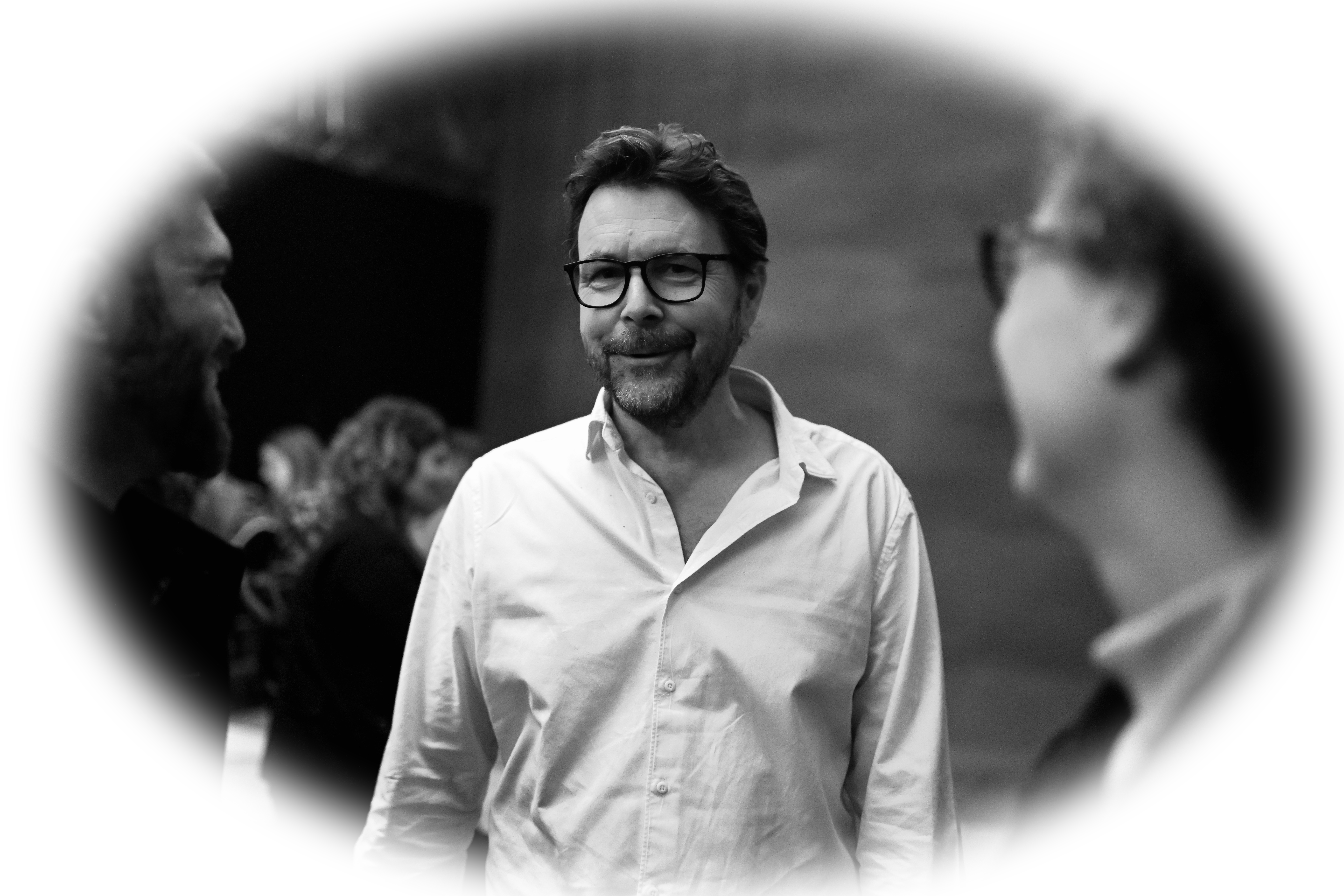
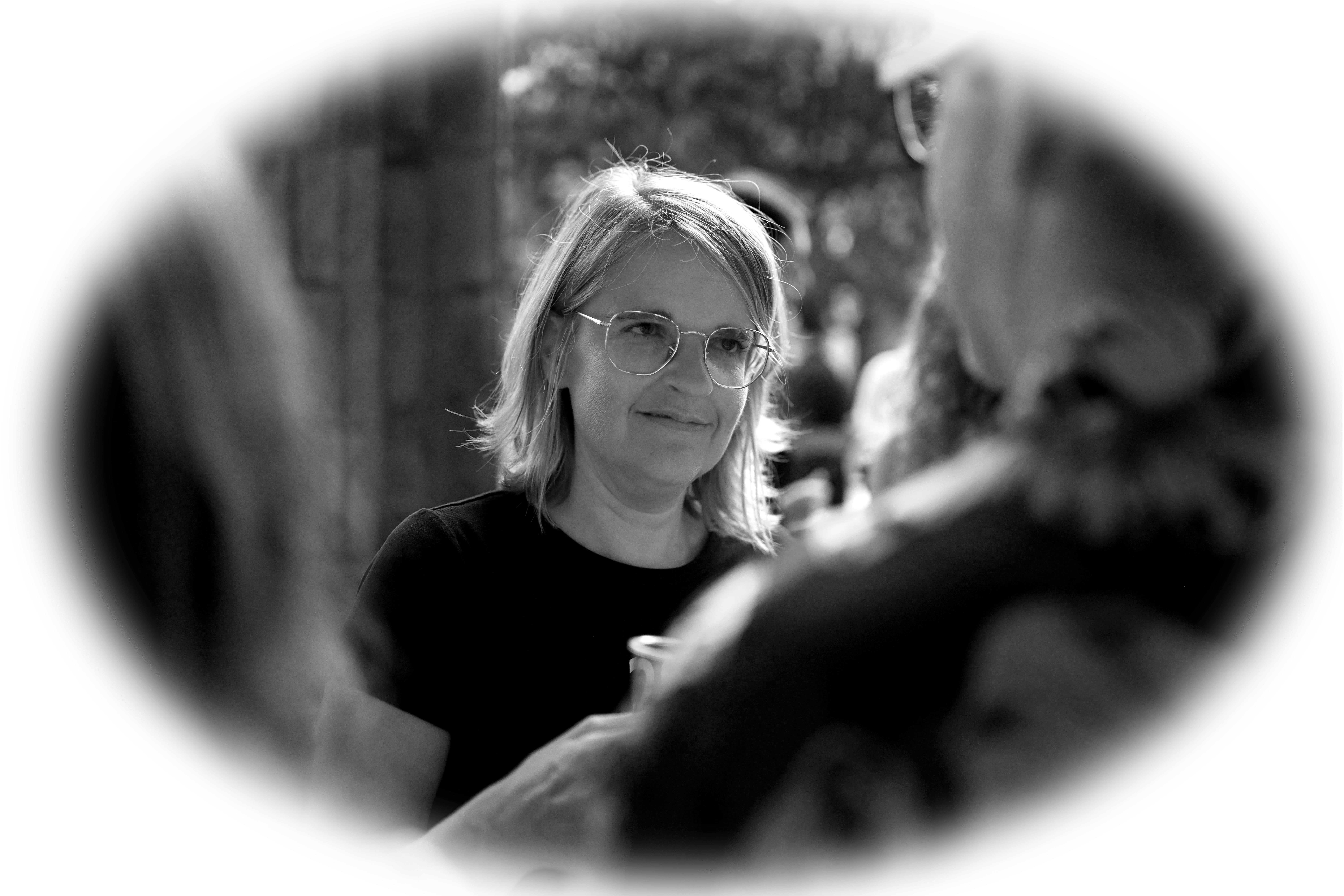
Perla 29 has developed a model of theatrical management based on process rigour, proximity to communication, innovation in management tools and, above all, involvement with artistic creation. This very own model has defined us and done so, because it has provided a meeting point between professionals from different cultural sectors and has consolidated a stable structure, capable of taking on major theatrical challenges with strong public projection.
Bet Orfila leads the general management and coordination of La Perla 29, together with Juli Macarulla, constantly seeking a balance between the challenge of the artistic engine and the viability of the project as a whole. It is a management model that enables us to work with a long-term vision, which is essential for the development of a solid artistic structure with constant activity.
Bet Orfila has worked in theater structures such as the Dramatic Centre of the Generalitat de Catalunya - Teatre Romea, the Teatre Nacional de Catalunya and also as a freelance, coordinated several theatrical productions.
In 2002 he founded La Perla 29 and the theatre management Pas 29, together with Juli Macarulla, Jordi Basomba and Xavier González, with art direction from Oriol Broggi and Carlota Subirós. The solidity and recognition of the management model that she leads, led Bet Orfila to participate in public processes of relevance, such as being president of ADETCA from 2016 to 2019, and to be part of several selection committees and important work tables for the performing arts sector, which denotes the public welcome of La Perla 29 as a motor of theatrical creation.
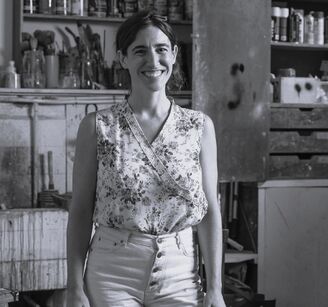 Gina Barbeta
Head of produccion
Gina Barbeta
Head of produccion
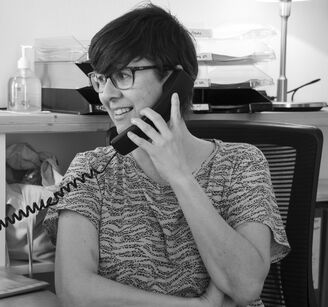 Silvia Barrera
Head of administration
Silvia Barrera
Head of administration
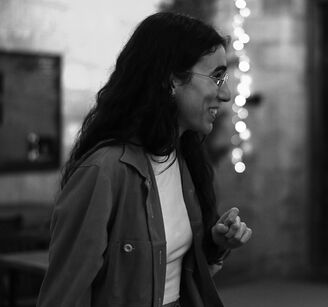 Laura Brito
Production
Laura Brito
Production
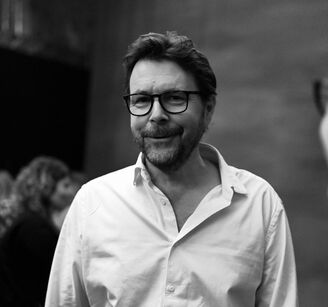 Oriol Broggi
artistic director
Oriol Broggi
artistic director
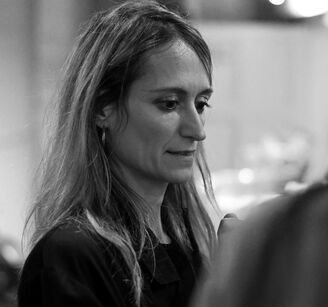 Eva Cartañà
Distribution and box office
Eva Cartañà
Distribution and box office
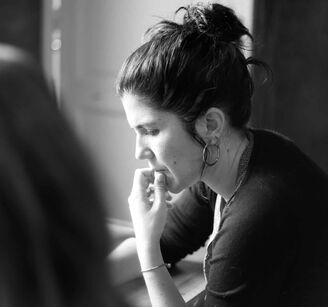 Ariadna Fernàndez
Head of communications
Ariadna Fernàndez
Head of communications
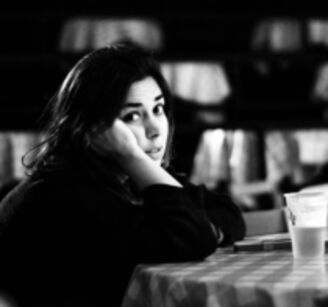 Lídia Figueras
Produccion and international distribution
Lídia Figueras
Produccion and international distribution
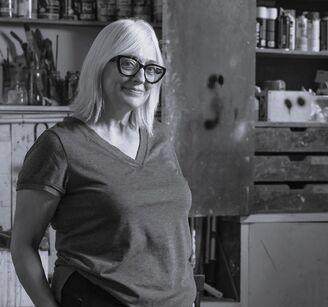 Victòria Jordà
secretariat
Victòria Jordà
secretariat
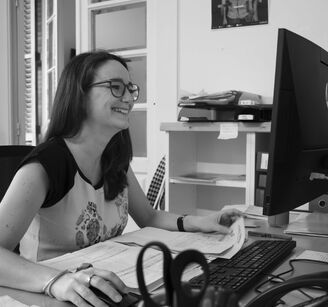 Alicia Lamelas
Administration
Alicia Lamelas
Administration
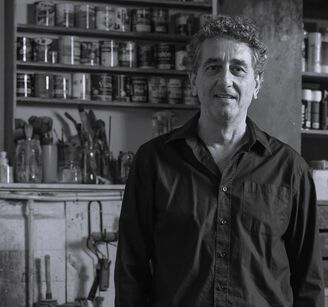 Juli Macarulla
Management
Juli Macarulla
Management
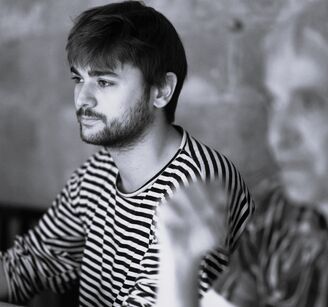 Pau Montull
technician
Pau Montull
technician
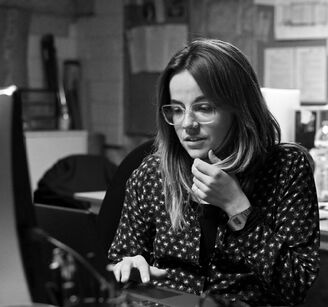 Anna Novell
Comunication and press
Anna Novell
Comunication and press
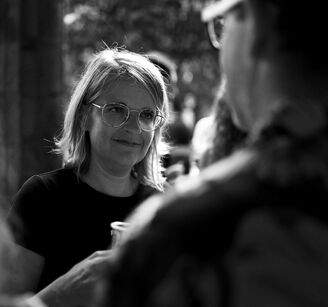 Bet Orfila
General direction and Manager
Bet Orfila
General direction and Manager
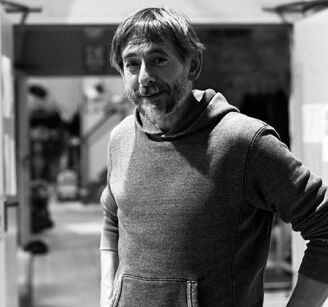 Cesc Pastor
Chief technician
Cesc Pastor
Chief technician
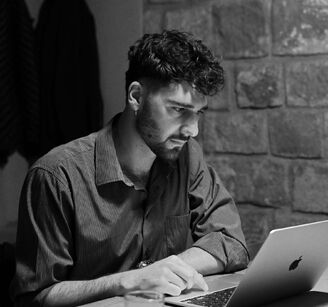 Albert Reverendo
Artistic coordination & Contents
Albert Reverendo
Artistic coordination & Contents
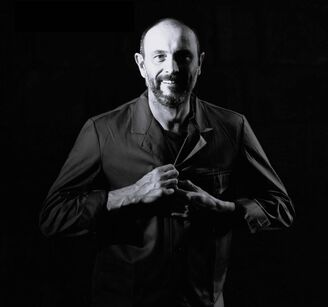 Marc Serra
Stage manager and spaces
Marc Serra
Stage manager and spaces
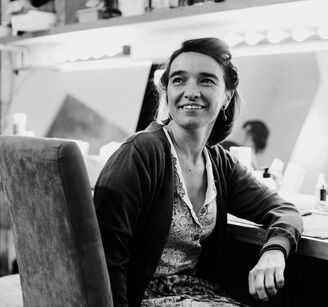 Montse Vellvehí
International project
Montse Vellvehí
International project
our newsletter
Vols fer-te soci de l’#AsSocPerla? Tota la informació aquí.
C/ Carme, 44 1r 2ª
Tel. 93 217 17 70
C/ Hospital, 56
Tel. 647 29 37 31
(a partir d'1h i 1/2
abans de la funció)
- Sitemap
- |
- Legal Notice
- |
- Cookies usage
- |
- Contact
- |








